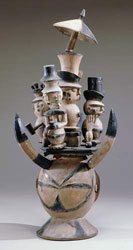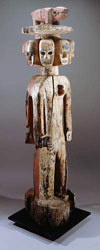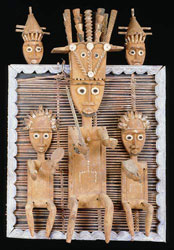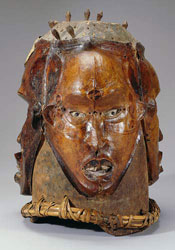

 Igbo, Ibibio, Ijo, and Ejagham peoples of southeastern Nigeria, masks represent ancestor or nature spirits. These masks appear at funerals and public performances and are responsible for the well being of the community.
Igbo, Ibibio, Ijo, and Ejagham peoples of southeastern Nigeria, masks represent ancestor or nature spirits. These masks appear at funerals and public performances and are responsible for the well being of the community. 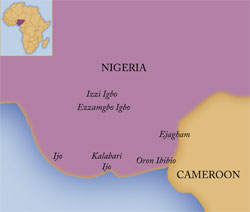 Masks take many forms including a four-eyed face, a highly abstracted elephant, and a tableau of figures under an umbrella. The Ejagham people cover their masks with antelope skin, a technique that is unique to the Cross River region. The Ijo people live along the rivers and estuaries of the Niger delta and many of their masks represent water spirits.
Masks take many forms including a four-eyed face, a highly abstracted elephant, and a tableau of figures under an umbrella. The Ejagham people cover their masks with antelope skin, a technique that is unique to the Cross River region. The Ijo people live along the rivers and estuaries of the Niger delta and many of their masks represent water spirits. Communities in eastern Nigeria were typically governed by councils of male elders. People who had attained wealth and prominence were initiated into associations organized in a series of grades; each grade allowed an initiate to gain deeper knowledge of local shrines and deities. Some of the art from this area is used on shrines and in the meeting rooms of the associations. Among the Kalabari Ijo, ancestors of prominent families are celebrated with memorial screens.
